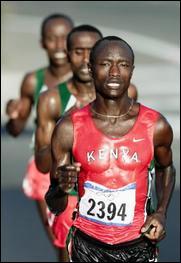
Kenyan marathon runner Eric Wainaina in front
during the men's marathon. Photo: RICK STEVENS
6:51PM, Oct 01
After almost two hours of running in the Olympic men's marathon, the gold medal had come down to a Japan-based Kenyan and two Ethiopians.
The race was following a distance running stereotype, too: Eric Wainana, the Kenyan, leading, Gezahgne Abera and Tesfaye Tola, the Ethiopian duo, following. A frustrated Wainana, tired of having his heels clipped, gestured to Abera to take the lead.
Asked to put up or shut up, Abera put up. He passed the Kenyan, increased his lead step by step, and went on to win his country's first Olympic marathon medal since 1972 and first gold since 1968, when Mamo Wolde won in Mexico City.
That was Ethiopia's third Olympic marathon win in a row, following the successive wins by the event's greatest ever, Abebe Bikila, in Rome and Tokyo. Who would have thought it would be another 32 years between drinks?
Abera won in two hours 10 minutes 11 seconds, running almost even splits over the course, which is far more difficult in the second half. Wainana, the Atlanta bronze medallist, stepped up one place to take silver in 2:10:31 and Tola took the bronze medal in 2:11:10. Jon Brown of England was fourth in 2:11:17, after sticking with the leaders almost to the 35-kilometre point.
Steve Moneghetti came through the field from outside the top 20 at half-way to finish 10th in 2:14:50 in his final international marathon. ''Thank you Australia, Steve Moneghetti, over and out,'' he said after crossing the line, tears streaming down his cheeks.
Moneghetti ran a conservative race, wanting to finish in good shape in front of his home crowd. ''I didn't know I was 10th until the finish,'' he said. His strength - honed through 15 years' training, a judicious racing routine and, until the past few years, very few injuries - told through the hills from 30 to 37 kilometres as he came through runner after runner.
The race had gone in the first half, however, as soon as the main pack decided it was time to chase breakway leader, Tiyapo Maso of Botswana. Domingos Castro of Portugal led the charge, stringing the bunch of over 50 runners out in a line. Lee Troop went with them, Moneghetti either could not or chose not to.
Troop stuck with the leaders until Anzac Bridge, but was dislodged on the climb and struggled home to finish in a little under 2:30.
The third Australian, Rod De Highden, ran solidly all the way to finishh 28th in 2:18:04.
Maso of Botswana was the breakaway leader from soon after the start. He took off over the early downhills at world record pace, way beyond the capabilities suggested by his personal best of 2:17:04 coming into the race. He was either acquiring form as he went, or going in way over his head. It turned out to be the latter.
Anzac Bridge also saw 1995 world champion Martin Fiz shaken off and 2000's fastest man, Antonio Pinto of Portugal, went soon after. Fiz ran on stgrongly to take sixth place, Pinto was the last man passed by Moneghetti and finished 11th.
Among the surprises, the Japanese trio of Nobuyuki Sato, Takayuki Inubushi and Shinji Kawashima were never in contention. Giacomo Leone of Italy was fifth, but his teammates Stefano Baldini and Vicenzo Modica were out by half-way. Fiz's teammates, the 1997 and 1999 world champion Abel Anton and Alberto Juzdado were never in it either.
Approaching Centennial Park, Maso's lead over the pack had stretched out to a minute. He had no form coming in, but was acquiring it as he went.
Tentative chase was given several times, the first credible contender to break from the pack in pursuit of the leaders was Hendrick Ramaala of South Africa.
A strong wind pushed the runners out to the Kingsford turnaround point on Anzac Parade, 18 kilometres into the race, at which point Maso was still a minute clear. For the first time, though, the pack was starting to nibble away at his lead.
From nibbles to bites: at the half-way point it was down to 35 seconds. Now the moves were coming from within the lead group, from those impatient to close the gap. Domingos Castro of Portugal surged, breaking the group up further as it came into Oxford St at Darlinghurst.
Maso was caught as the race approached the bottom of Bathhurst Street.